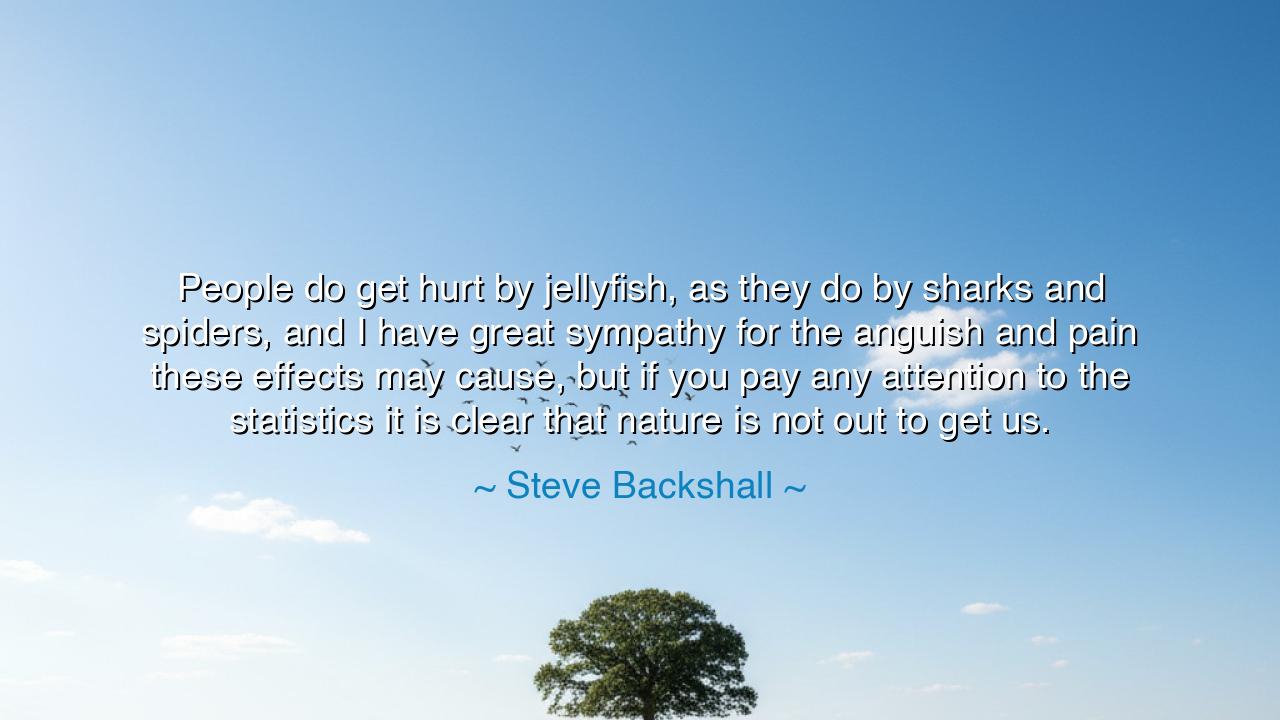
People do get hurt by jellyfish, as they do by sharks and
People do get hurt by jellyfish, as they do by sharks and spiders, and I have great sympathy for the anguish and pain these effects may cause, but if you pay any attention to the statistics it is clear that nature is not out to get us.






When Steve Backshall proclaimed, “People do get hurt by jellyfish, as they do by sharks and spiders, and I have great sympathy for the anguish and pain these effects may cause, but if you pay any attention to the statistics it is clear that nature is not out to get us,” he sought to pierce the veil of fear that blinds so many. His words remind us that the world of nature, so often painted in human imagination as cruel or hostile, is not an enemy, but a vast and indifferent order. Yes, there is pain in the sting of a jellyfish, the bite of a spider, or the sudden strike of a shark. But these are not the calculated cruelties of a foe. They are accidents of existence, fragments of survival in the endless chain of life.
The origin of his truth lies in the human tendency to project onto nature the emotions of our own hearts. For centuries, storms were seen as the anger of gods, diseases as curses, wild beasts as demons in fur and scale. Yet the deeper we have studied creation, the clearer it becomes: nature is not out to get us. The jellyfish drifts, the shark hunts, the spider spins its web—not with malice toward man, but in pursuit of survival. It is only when we stumble into their path that we feel the sting, the bite, the sudden jolt of fear.
History teaches us this lesson with clarity. When European explorers first ventured into distant seas, tales of sea monsters filled their journals. Sailors swore that great leviathans pursued ships, determined to destroy them. But as science grew, these monsters were revealed to be whales, colossal but indifferent, living their lives in the deep. The terror was real, but the malice was imagined. So too with jellyfish and spiders: we see in their actions not truth, but the reflection of our fear.
The meaning of Backshall’s words is a call to humility. To fear nature as if it were a plotting enemy is to misunderstand it, and in misunderstanding, to lose the chance for harmony. The statistics, as he says, reveal the truth: that far more people perish from car crashes, disease, or even simple slips in the home than from all the creatures of land and sea combined. Yet we tremble before the shark and not the staircase, curse the spider and not the wheel of the machine. This blindness arises because the mystery of the wild awakens old fears, stirring in us the ancient memory of vulnerability.
The lesson here is that fear must be tempered by wisdom. Respect nature, yes; avoid recklessness, yes; but do not let your heart be ruled by the illusion that the earth itself conspires against you. Fear leads to destruction: men slaughtered sharks en masse, hunted wolves to near extinction, and crushed spiders underfoot—all born not from necessity, but from terror and misunderstanding. Yet when we see clearly, we learn to protect, to coexist, to stand in awe rather than in enmity.
What, then, should you do? First, when fear arises in you—of the sting, of the bite, of the shadow in the wild—pause, and remember Backshall’s teaching: nature is not out to get us. Second, seek knowledge; let the light of science dissolve the shadows of superstition. Third, carry respect into every encounter with the living world: give creatures space, honor their role, and guard the fragile balance of life. For sympathy, as Backshall says, belongs not only to the human who suffers pain, but also to the creatures whose lives are misunderstood.
Thus, let his words be remembered: “Nature is not out to get us.” This is not the cry of denial but of liberation. It is the freeing of the human heart from needless terror, and the awakening of reverence for the wild. And the wisdom we must take is this: do not war against creation, for it is not your foe. Walk instead as a student, a steward, a companion of the earth. For in harmony with nature lies not only survival, but the deepest peace.






AAdministratorAdministrator
Welcome, honored guests. Please leave a comment, we will respond soon